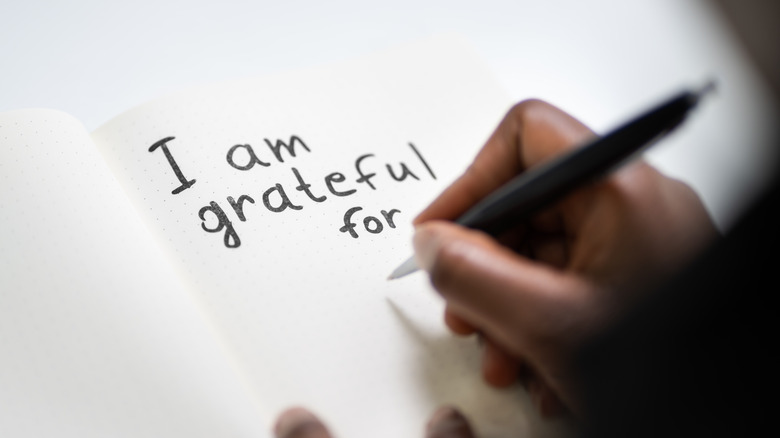Take Advantage Of These Mental Health Benefits When You Start Journaling
Most of us probably think of journaling as merely all about putting your secrets down on paper, like a teenage diary. But in reality it's far more complex, as it turns out writing expressively offers numerous mental health benefits. As Talkspace Therapist Bisma Anwar explained, "Journaling is a healthy coping strategy that includes mindfulness of emotions and insight building which can happen when we start to write down our thoughts and feelings."
This can be particularly helpful outlet for when we're going through a hard time and need to process situations on our own. But even if things are going pretty well, journaling is a great practice to maintain your overall wellbeing. Amongst some of the different ways you can put pen to paper (or finger to keyboard) are reflective journaling, which involves reflecting on past experiences, gratitude journaling, which involves noting the things in our lives that make us the happiest, and bullet journaling, which utilizes shorter, sharper bursts of text that can determine goals or things to do that day. Whatever method of journaling you decide to try, here are some mental benefits you can expect.
Develop a sense of purpose
In a literal sense, contributing to a journal can be a great way to establish a sense of routine, which can be beneficial for people who feel like their lives are all over the place. It also provides you with an outlet for you to spend your time instead of dwelling on the negative thoughts or taking part in destructive practices.
But one of the biggest ways journaling helps us develop a sense of purpose is by encouraging introspection. It's an opportunity to ask yourself questions and explore different possibilities, which you may not have time to do in your daily life. What do you want out of this year? What are you struggling with? You're free to be as honest as you want, because the only other person reading it is you! This can help you be more intentional with not only your daily schedule, but in the planning of your own life. Psych Central provides different prompts that can inspire you to think deeply about your life and what you want out of it.
Build self-confidence
There's a reason why journaling is thought of as a form of self care. It's an opportunity to work on your relationship with yourself and connect with your feelings, while also practicing positive self-talk. Dedicating entries to reflect on your wins, no matter how big or small, for instance, can serve as a reminder that you are capable of accomplishing great things.
And its not just about identifying strengths. Journaling also provides a safe and private space to work out any internal struggles or confront our fears without judgment. For instance, if you're worried about an upcoming party, you might write down that you're feeling anxious about it because you're nervous to meet new people. With each day that passes, you can return to that thought and plan strategies for how you'll deal with the situation. In this case, maybe it's bringing a friend along. But even if things don't go the way you planned, you can recap it on paper and refer to your written reminders that you are more than the outcome of one situation. The goal isn't about achieving perfection, it's about reflecting and being your own biggest cheerleader. After all, as Laura Maloney of the podcast "The Self Set" told It's All You Boo, "The more you journal like this, the more you're teaching yourself to respond to your inner-critic with love instead of fear. Confidence takes time to grow."
Become more self-aware
Speaking to Today, licensed psychologist Dr. Sabrina Romanoff said, "Oftentimes we approach our thoughts as facts which can get us into trouble when we believe our most anxiety-provoking thoughts without hesitation." She notes that journaling can serve as a means to combat that by providing us with a place to separate our thoughts from ourselves. "The process of reading a biased thought outside of your mind can provide an alternative outlook and [help you] see things more clearly," she added.
But journaling isn't just beneficial for dealing with one-off situations. Keeping a regular record of your thoughts with a journal allows you to go back and reflect on them later so you can see where you were wrong or even irrational. This can be helpful if you struggle to manage your emotions and find yourself getting worked up over things you maybe don't actually warrant such a strong reaction. Sometimes, recounting those feelings isn't always easy, but it's important to confront them so we can work on our own personal growth and mental health journey. In the long run, this practice will prompt you to be more mindful of your own emotions, and therefor develop a greater sense of self-awareness. This, Insider points out will have a tremendously positive impact on your well-being. The outlet notes that being more self-aware will encourage you to take a problem-solving approach to situations, rather than letting your emotions consume you.
Change your outlook on life
Ever hear the saying, positive thinking can leads to positive outcomes? Well, journaling can help with that.
Research has suggested that by using a journal to write down positive thoughts and affirmations, a person can feel genuinely more positive about their life. Gratitude journaling in particular, which focuses on regularly acknowledging all of the positive things in your life can be instrumental for pushing out negative energy. One study published in Barbara Frederickson's Positivity: Ground-breaking Research to Release Your Inner Optimist and Thrive," of people who journaled found that "participants who regularly drew their attention to aspects of their lives that made them feel blessed increased their positivity." And it's not just all manifestation mumbo jumbo. Using your journal to document all the important reminders such as reasons why you're deserving of that promotion, can totally change your outlook on life, while doing wonders for your self esteem. One 2018 study followed 70 adults with medical conditions like depression and anxiety and asked them to answer journal prompt focused on favorable aspects of their life, which people often take for granted. At the end of the process, approximately 18% of the respondents reported feeling a notable increase in their overall well-being and a greater resilience to deal with things that may come their way.
You can introduce gratitude journaling easily into your daily life by committing time to write down what you're grateful for. Reader's Digest offers prompts like writing about what you're excited for that week, your favorite parts of your day, or recounting moments that made you smile.
Reduce stress levels
Many therapists have endorsed journaling as an extremely useful form of emotional relief because it gives you a safe, judgment-free space to vent all of your unfiltered thoughts and feelings. Dr. Carla Manly, a clinical psychologist told Today that release can be cathartic, especially if you've been internalizing a lot. If we aren't in the right headspace to talk to a friend, or we have situations we'd rather keep to ourself, this private space can be beneficial. It doesn't have to require a ton of thought or even follow a prompt. Positive Psychologist Mihály Csíkszentmihályi told Marie Claire U.K. letting your stream of consciousness flow on the paper is sometime all you need to get your thoughts, and by that extension, yourself outside of your own head.
The very act of journaling can be soothing as well, serving as an escape from the hustle and bustle of routine, Locus Therapy points out. Moreover, the writing process itself can help you gain clarity when it comes to the thoughts and feelings that can sometimes seem so jumbled in your head, and motivate you to problem solve. Per Very Well Mind, many people find it easier to deal with stressful situations and come to rational conclusions after seeing things in writing. For some people, simply getting all of their worries down, taking a breather, and returning to them later can help them get a clearer understanding of how to move forward.
Ease symptoms of depression
Healthline says although journaling shouldn't ever replace proper psychological treatment, it can be an effective outlet for coping with depression and anxiety symptoms. Logging details about your day and the feelings that came with it helps you to track your moods and figure out patterns you may not otherwise notice. This can make dealing with intense emotions significantly less overwhelming, Kailey Hockridge, LPCC tells Choosing Therapy. "When you experience depression, it can often seem as though that is the only thing you feel; it can be helpful to intentionally practice recognizing and validating the other emotions you experience alongside your feelings of depression," she told the outlet. Moreover, if through your journaling, you realize there's a situation or a person that sets off stress or heightened emotions in yourself, you can work to minimize its presence in your life.
The benefits may prove to be immediate. One 2013 study following patients with depression published in the Journal of Affective Disorders found that many experienced decreased levels of symptoms after less than one week of committing to 20 minutes of journaling. Choosing Therapy highlights that even setting aside a few minutes to journal every night before bed can help you develop healthier habits and coping strategies.
Manage PTSD symptoms
Research has suggested that those experiencing symptoms of post-traumatic stress disorder (PTSD) may see specific benefits from journaling. One 2015 study published in the Journal of Traumatic Stress found some US war veterans who engaged in expressive writing over a period of six months experienced fewer PTSD symptoms than before they began the practice. In fact, per The American Psychological Association, regular journaling has been shown to decrease the instances of intrusive thoughts as effectively as cognitive behavioral therapy. One reason for this is that journaling offers a safe space to reflect and process suppressed emotions. As noted by one 2005 study published by The Royal College of Psychiatrists, when patients with PTSD took the time to revisit the site of trauma in their mind and write it down, it helped them develop a better understanding and perspective on they're suffering. Mark Lumley, a Clinical Psychologist and Psychology Professor, agrees with this, telling Arthritis Foundation, "Expressive writing can help bring forward those less-accessible feelings besides anger that don't always have a voice...Writing this way reduces inner conflict and provides you a better sense of emotional balance — and perhaps even less pain – when you express those feelings on paper."
But while journaling can be a low-cost and easy way of treating symptoms of PTSD, it's important to note that it may not be a viable option for everyone struggling with the condition, as reliving past trauma can be an extremely difficult task.
Stay focused on your goals
Journaling doesn't have to be all about reflecting on the past events that have happened. For instance, bullet journaling or personal planning journaling sees people write daily about what they want out of life, from day-to-day tasks and career goals to memories they want to make. The idea is that being able to see clearly on paper exactly what needs to be done will help you stay focused and motivated. Per CENT, it prompts you to view the goal as a genuinely tangible thing you can accomplish rather than a vague nearly impossible dreams in your head. This can provide relief for people with conditions like anxiety, ADHD, or anyone who struggles to organize their thoughts or frequently procrastinates on important tasks.
Once you've started writing your goals, use your journal to as a way to check in with yourself and track how you're doing. Whether you're trying to stick to a new skincare or running routine, or simply planning to make a better effort to be more social, you can use your journal to track how you're doing. Plus, each time you complete a goal, you can refer back to the journal and remind yourself of all that you've accomplished.








